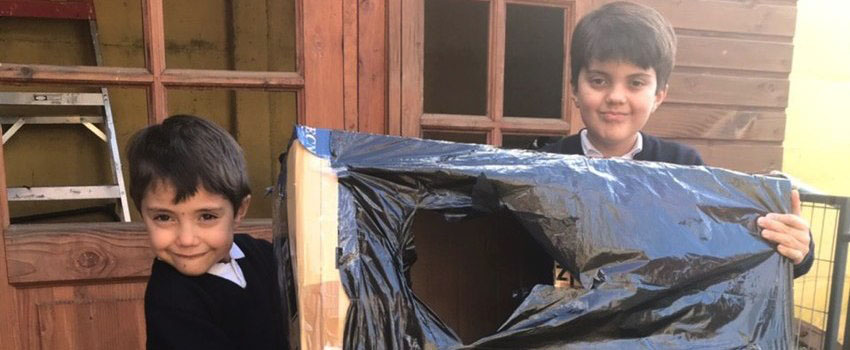
The tutorial “How to build a projection box for the eclipse” allowed families from different parts of the country to enjoy the astronomical phenomenon.
Last July 2, in the Coquimbo Region, an astronomical phenomenon of global importance was experienced, such as the total eclipse of the sun, which has been classified as a unique and unforgettable experience that managed to be witnessed in its entirety due to the good weather conditions.
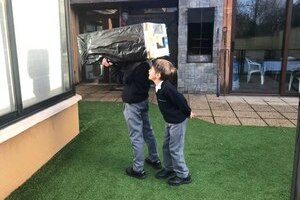 This great event was partially noticeable in other regions of the country, however, not all of them suffered the same fate. An example of this was what happened in the city of Temuco, where heavy rain prevented us from directly observing the eclipse.
This great event was partially noticeable in other regions of the country, however, not all of them suffered the same fate. An example of this was what happened in the city of Temuco, where heavy rain prevented us from directly observing the eclipse.
The Jofré Grandon family, as well as the respect of the community, hoped to be part of this event, but upon knowing the weather conditions for the date of the eclipse, they looked for alternative ways to not be left out of an experience of this level.
“Through social networks, I found a video lesson developed by the University of La Serena, where they taught how to make an eclipse projection box. I found it quite interesting and educational, and my children and I got excited about the project and decided to carry it out, hoping to be able to observe a little of the eclipse despite the bad weather conditions," says Pablina Grandon, who looked for a way for her children to Nicolás and Facundo, 9 and 6 years old respectively, could enjoy the event.
Although there were not many expectations of actually witnessing the eclipse, Pablina prepared the material presented by the ULS, since she considered it a didactic and innovative way for her children to learn about science.
Finally, to their surprise and despite the fact that during the eclipse it was a cloudy and rainy day, at one point they managed to see a beam of light that allowed them to use the projection box. “Here in the region they did not even sell glasses to see the eclipse, that day it was raining from midday, until at one point a small window of light opened and we began to see if our project worked, until my youngest son managed to see the eclipse thanks to the projection that was carried out inside the box,” he explained.
“I am extremely grateful that a University, with the prestige that the University of La Serena has, has the ability to visualize the importance of sharing knowledge with the community, this tutorial has allowed us to foster creativity and interest in science in our community. family and I imagine in others,” said Pablina.
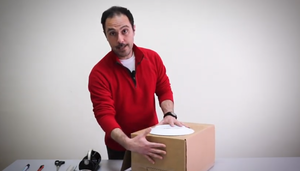 For their sons Nicolás and Facundo it was a great experience to be able to carry out this experiment that allowed them to be close to an astronomical phenomenon of great importance such as a solar eclipse, and they were very grateful to the ULS and to the astronomer in charge of the project. , Dr. Rodolfo Angeloni. “We are very happy and grateful to the University for teaching us how to build this box and for helping us protect our eyes and not damage them with the sun,” they said from Temuco.
For their sons Nicolás and Facundo it was a great experience to be able to carry out this experiment that allowed them to be close to an astronomical phenomenon of great importance such as a solar eclipse, and they were very grateful to the ULS and to the astronomer in charge of the project. , Dr. Rodolfo Angeloni. “We are very happy and grateful to the University for teaching us how to build this box and for helping us protect our eyes and not damage them with the sun,” they said from Temuco.
A rewarding job
For Rodolfo Angeloni, astronomer at the University of La Serena and author of the tutorial, it is very significant to receive positive comments regarding the work done for the community. “Seeing the reception of all this work is motivating, all the effort in this work comes from the passion for astronomy and knowing that people appreciate and value all our work is a priceless feeling,” says Angeloni regarding the response he has received thanks to this job.
Furthermore, he indicates that people have recognized him for this video and have thanked him for sharing a different and educational way to observe the solar eclipse. “A few days ago a student approached me and thanked me for teaching the community about this topic, the same has happened with academic colleagues and people on social networks, where I have received good comments, I even know that the video has had high levels of reproduction at the national level,” he said.
He adds that he hopes this work will be recognized and position the University of La Serena as one of the academic references in terms of astronomy at the national level, in view of the next astronomical phenomenon that will occur in the country. “Our objective as the ULS astronomy team is to be able to transform the University into a strategic partner for the universities of Temuco in the face of the next solar eclipse in 2020, hoping to be able to use our experience acquired during this year,” explained the professional.
He also mentioned that all this work and the reward it has meant generates a feeling very similar to the one experienced during the total solar eclipse on July 2, a feeling that he cannot describe in words.
Written by Tomás Rodríguez, DirCom
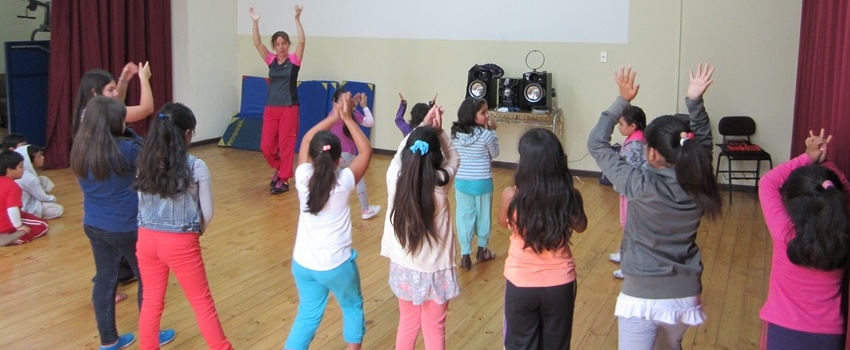

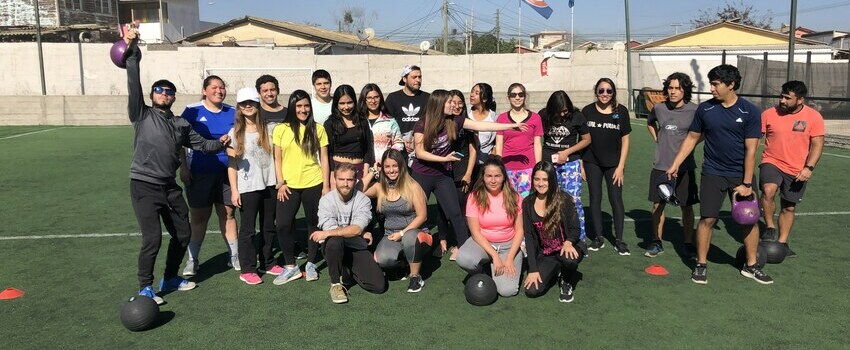
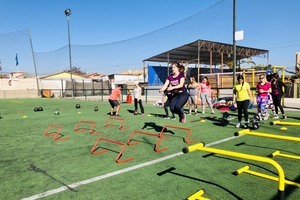
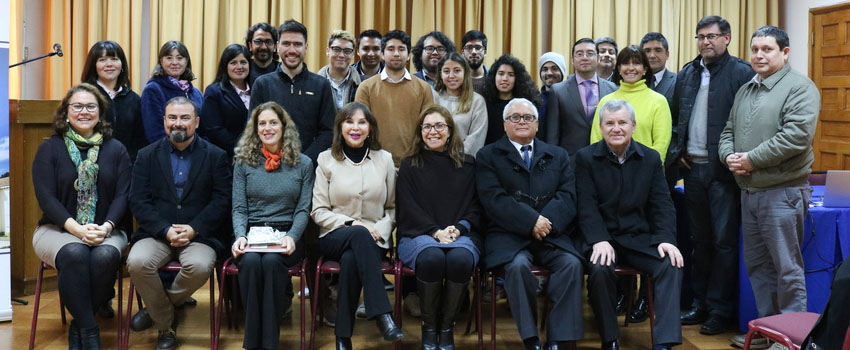
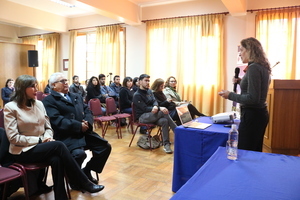 Paola Banchero is an associate professor in the Department of Communication and Journalism at the University of Alaska Anchorage, and has worked as a reporter and editor in different media outlets. In addition, she has taught courses and worked on the making and execution of documentaries related to the impact of climate change.
Paola Banchero is an associate professor in the Department of Communication and Journalism at the University of Alaska Anchorage, and has worked as a reporter and editor in different media outlets. In addition, she has taught courses and worked on the making and execution of documentaries related to the impact of climate change.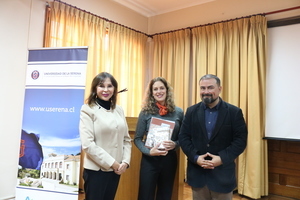 The journalist from the University of Alaska emphasized the essential role that communicators have, and reinforced that it consists of continuous learning. “I think we are learning how to cover these events, we have had 25 or 30 years of news on the subject and many excellent cases, but in reality the coverage has been very focused on guilt and this is a problem without providing solutions, so I want to communicate the importance of providing people with solutions that are understandable and within reach,” he expressed.
The journalist from the University of Alaska emphasized the essential role that communicators have, and reinforced that it consists of continuous learning. “I think we are learning how to cover these events, we have had 25 or 30 years of news on the subject and many excellent cases, but in reality the coverage has been very focused on guilt and this is a problem without providing solutions, so I want to communicate the importance of providing people with solutions that are understandable and within reach,” he expressed.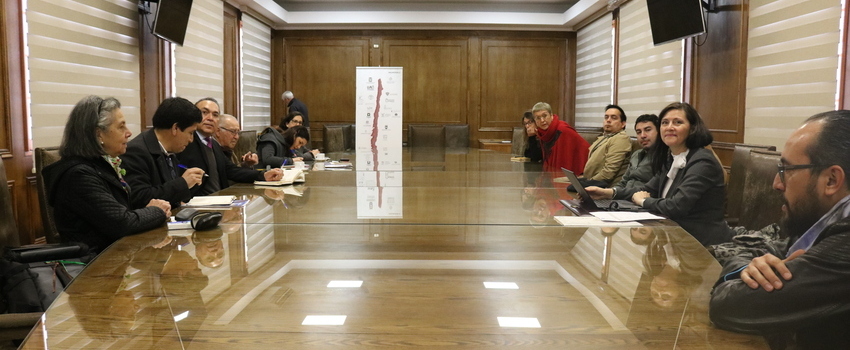
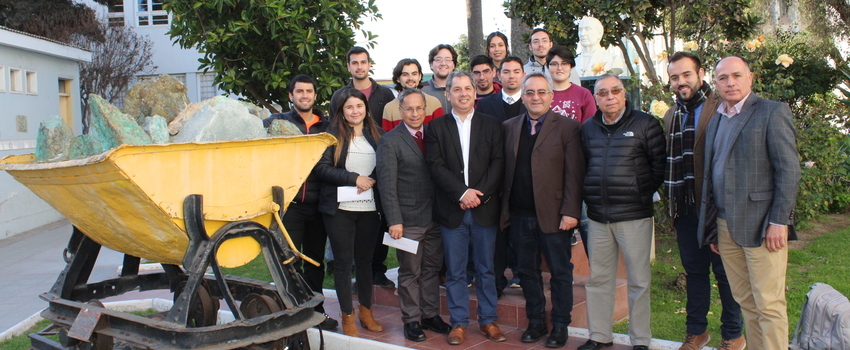

 This great event was partially noticeable in other regions of the country, however, not all of them suffered the same fate. An example of this was what happened in the city of Temuco, where heavy rain prevented us from directly observing the eclipse.
This great event was partially noticeable in other regions of the country, however, not all of them suffered the same fate. An example of this was what happened in the city of Temuco, where heavy rain prevented us from directly observing the eclipse. For their sons Nicolás and Facundo it was a great experience to be able to carry out this experiment that allowed them to be close to an astronomical phenomenon of great importance such as a solar eclipse, and they were very grateful to the ULS and to the astronomer in charge of the project. , Dr. Rodolfo Angeloni. “We are very happy and grateful to the University for teaching us how to build this box and for helping us protect our eyes and not damage them with the sun,” they said from Temuco.
For their sons Nicolás and Facundo it was a great experience to be able to carry out this experiment that allowed them to be close to an astronomical phenomenon of great importance such as a solar eclipse, and they were very grateful to the ULS and to the astronomer in charge of the project. , Dr. Rodolfo Angeloni. “We are very happy and grateful to the University for teaching us how to build this box and for helping us protect our eyes and not damage them with the sun,” they said from Temuco.